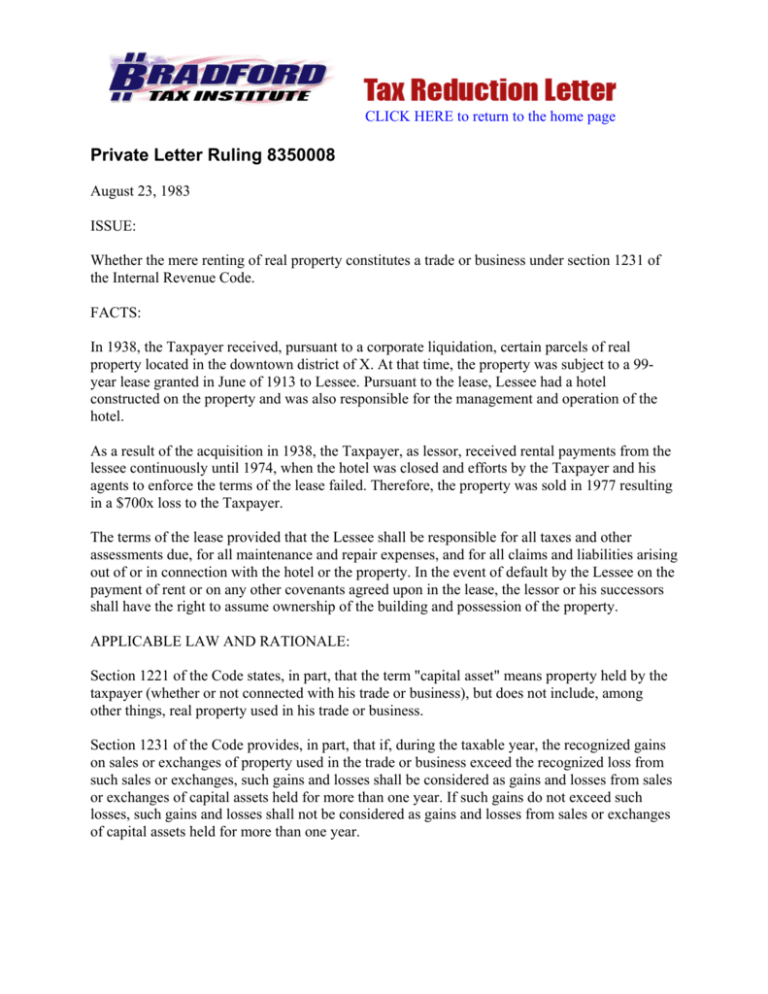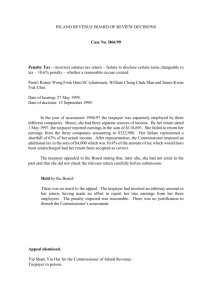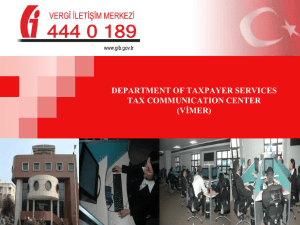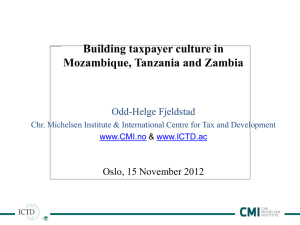Private Letter Ruling 8350008
advertisement

CLICK HERE to return to the home page Private Letter Ruling 8350008 August 23, 1983 ISSUE: Whether the mere renting of real property constitutes a trade or business under section 1231 of the Internal Revenue Code. FACTS: In 1938, the Taxpayer received, pursuant to a corporate liquidation, certain parcels of real property located in the downtown district of X. At that time, the property was subject to a 99year lease granted in June of 1913 to Lessee. Pursuant to the lease, Lessee had a hotel constructed on the property and was also responsible for the management and operation of the hotel. As a result of the acquisition in 1938, the Taxpayer, as lessor, received rental payments from the lessee continuously until 1974, when the hotel was closed and efforts by the Taxpayer and his agents to enforce the terms of the lease failed. Therefore, the property was sold in 1977 resulting in a $700x loss to the Taxpayer. The terms of the lease provided that the Lessee shall be responsible for all taxes and other assessments due, for all maintenance and repair expenses, and for all claims and liabilities arising out of or in connection with the hotel or the property. In the event of default by the Lessee on the payment of rent or on any other covenants agreed upon in the lease, the lessor or his successors shall have the right to assume ownership of the building and possession of the property. APPLICABLE LAW AND RATIONALE: Section 1221 of the Code states, in part, that the term "capital asset" means property held by the taxpayer (whether or not connected with his trade or business), but does not include, among other things, real property used in his trade or business. Section 1231 of the Code provides, in part, that if, during the taxable year, the recognized gains on sales or exchanges of property used in the trade or business exceed the recognized loss from such sales or exchanges, such gains and losses shall be considered as gains and losses from sales or exchanges of capital assets held for more than one year. If such gains do not exceed such losses, such gains and losses shall not be considered as gains and losses from sales or exchanges of capital assets held for more than one year. Section 1231(b)(1) of the Code provides, in part, that the term "property used in the trade or business" means real property used in the trade or business held for more than one year, other than four specific categories of property, none of which are applicable in this case. Prior to 1942, depreciation was allowable on property only if it qualified as "property used in the trade or business," and an individual's expenses of managing property were deductible only if they qualified as business expenses. To afford individuals depreciation and expense deductions relating to their rental property, the courts and the Service relied on the theory that all rental property is used in trade or business. After the enactment of section 167(a)(2) of the Code and prior to the enactment of section 172 of the Code in 1954, taxpayers who sold rental property at a loss successfully argued that the property was a capital asset to secure the ability to carry the loss to another tax year. After 1942, the Tax Court made a distinction between improved and unimproved property. The mere rental of improved real property was considered to constitute a trade or business. See Hazard v. Commissioner, 7 T.C. 372 (1946), acq., 1946-2 C.B. 3. See also Stratton v. Commissioner, T.C. Memo 1962-218 and Spindler v. Commissioner, T.C. Memo 1963-202. The rental of unimproved real property was subject to a facts and circumstances test. In Emery v. Commissioner, 17 T.C. 308 (1951), the Tax Court held that the loss sustained by the taxpayer, a liquidating trust, from the sale of unimproved rental property was a capital loss. In Good v. Commissioner, 16 T.C. 906 (1951), acq., 1951-2 C.B. 2, unimproved land rented for pasture land was held to be used in a trade or business due to the consistent attempts by the taxpayer to rent the land. In the recent case of Curphey v. Commissioner, 73 T.C. 766 (1980), the Tax Court indicated the possible abandonment of their dichotomy between improved and unimproved real property. The Tax Court stated that the ownership and rental of real property does not, as a matter of law, constitute a trade or business. In the final analysis, the issue is ultimately one of fact in which the scope of the ownership and management activities may be an important consideration. Several District Courts and Circuit Courts have adopted a facts and circumstances test in determining whether rental property is trade or business property for purposes of section 1231 of the Code. In Rogers v. United States, 69 F.Supp. 8 (D.Conn.1946), the court stated that the trade or business test requires activity which is continuous, systematic, and, at least in view of the number of properties managed, substantially extensive. In Durbin v. Birmingham, 92 F.Supp. 938 (D.La.1950), the court held that unimproved land rented to sharecroppers was a capital asset and not property used in a trade or business. The loss on the sale was a capital loss. In Grier v. United States, 120 F.Supp. 395 (D.Conn.1954), aff'd., 218 F.2d 603 (2d Cir.1955), the Second Circuit determined that a residential rental home inherited by the taxpayer in 1932 was a capital asset. At the time the house was inherited, it was rented to a tenant who had occupied the premises for years and who continued to do so until its sale in 1946. The court noted that the activities with respect to the dwelling, although of long duration, were minimal in nature. Activity to rent and rerent was not required. No employees were regularly engaged for maintenance or repair. Lacking the broader activities stressed in Rogers v. United States, supra; Pinchot v. Commissioner, 113 F.2d 718 (2d Cir.1940); Gilford v. Commissioner, 201 F.2d 735 (2d Cir.1953); and Fackler v. Commissioner, 133 F.2d 509 (6th Cir.1943); the court stated that the real estate appears to partake more of the nature of property held for investment than property used in a trade or business. See also Mercado v. United States, 64-1 U.S.T.C. 9209 (2d Cir.1964), rem., 215 F.Supp. 631 (S.D.N.Y.1963). In Bauer v. United States, 168 F.Supp. 539, 144 Ct. Cl. 308 (Ct.Cl.1958), the Court of Claims stated that the question to be determined is whether the taxpayer's activities, personally or through agents, in connection with the property, are so extensive as to rise to the stature of his trade or business. In Union National Bank of Troy v. United States, 195 F.Supp. 382 (N.D.N.Y.1961), the court stated that the trade or business test relates to a search for continuous, regular and substantial activity in relation to the management of the property that would give logical basis to a conclusion that it was one used in a trade or business. In view of the foregoing cases, the Service takes the position that the mere rental of real property does not constitute a trade or business under section 1231 of the Code. In order to constitute property used in a trade or business under section 1231, the income or gain must be derived from properties used in the active conduct of a trade or business as opposed to property which is reasonably expected to generate passive income such as portfolio investments. In the present case, the lease provides that the Lessee shall be responsible for all taxes and other assessments due, for all maintenance and repair expenses, and for all claims and liabilities arising out of or in connection with the hotel or the property. The Taxpayer-lessor engaged in little or no activity with respect to the property. When originally presented with the issue in this case, the National Office issued a technical advice memorandum, dated July 30, 1980, favorable to the taxpayer. In view of the adverse holding of this memorandum, the taxpayer has asked that the reconsideration of the July 30, 1980, technical advice memorandum be applied without retroactive effect under the discretionary authority provided by section 7805(b) of the Code. Section 7805(b) of the Code states that the Secretary may prescribe the extent, if any, to which any ruling or regulations, relating to the Internal Revenue laws, shall be applied without retroactive effect. Section 301.7805-1(b) of the Income Tax Regulations provides that the Commissioner may prescribe the extent, if any, to which any ruling relating to the Internal Revenue laws, issued by or pursuant to authorization from the Commissioner, shall be applied without retroactive effect. Section 12.01 of Rev.Proc. 83-2, 1983-1 I.R.B. 28 states that pursuant to section 7805(b) of the Code, it is within the discretion of the Commissioner or the Commissioner's delegate to prescribe the extent, if any, to which any ruling (including technical advice) will be applied without retroactive effect. It also states that the Associate Chief Counsel, the Commissioner's delegate, may be requested to exercise the discretionary authority under section 7805(b) of the Code to limit the retroactive effect of any holding stated in the technical advice memorandum or limit the retroactive effect of any subsequent modification or revocation of the technical advice memorandum. Although a favorable technical advice memorandum was previously issued with respect to the sale transaction that is the subject of the adverse holding in this technical advice memorandum, the favorable memorandum was issued after the transaction and therefore, presents no reliance on which to predicate a grant of section 7805(b) relief. The taxpayer's request for relief is based upon statements in the Internal Revenue Manual and in an IRS publication, acquiescences issued with respect to several Tax Court cases, and a private letter ruling issued to another taxpayer. The taxpayer cites IRM 4234, Tax Audit Guidelines and Techniques for Tax Audits, section 74(10)(9), which states that "loss on sale of rental property is a business loss, deductible in full in year of loss. Many taxpayers and accountants erroneously apply the $1,000 capital loss limitation and carry the balance over to subsequent years." The taxpayer also cites IRM Publication 544, Sales and Other Dispositions of Assets (1982), p. 26, which states that a gain or loss on sale, exchange, or involuntary conversion of property used in your business or held for the production of rents or royalties (and held one year or less) is an ordinary gain or loss. Pamphlets published by the Service are treated like information letters. They are not designed to be relied upon by taxpayers in planning future transactions. This was reaffirmed in Adler v. Commissioner, 330 F.2d 91 (9th Cir.1964). The court, in denying the taxpayer's claim, stated "... nor can any interpretation by taxpayers of the language used in government pamphlets act as an estoppel against the government, nor change the meaning of taxing statutes ..." See also the recent decision in Manocchio v. Commissioner, 710 F.2d 1400, 83-2 U.S.T.C. P9478 (9th Cir.1983), or 710 F.2d 1400, 52 A.F.T.R.2d 83-5566 (1983). The taxpayer cites Rev.Rul. 65-259, 1965-2 C.B. 174; Rev.Rul. 70-283, 1970-1 C.B. 26; Rev.Rul. 75-557, 1975-2 C.B. 33; and Rev.Rul. 80-26, 1980-1 C.B. 66; as examples where section 7805(b) relief was granted as a result of cases that the Service previously acquiesced in. The taxpayer argues that the acquiescences in Schwarcz v. Commissioner, 24 T.C. 733 (1955), acq., 1956-1 C.B. 5; Good v. Commissioner, 16 T.C. 906 (1951), acq., 1951-2 C.B. 2; Jamison v. Commissioner, 8 T.C. 173 (1947), acq., 1947-1 C.B. 2; Noble v. Commissioner, 7 T.C. 960 (1946), acq., 1946-2 C.B. 4; and Hazard v. Commissioner, 7 T.C. 372 (1946), acq., 1946-2 C.B. 3, are direct authority for the proposition that the mere rental of improved real property constitutes a trade or business under section 1231 of the Code. The acquiescence in each of the decisions cited by the taxpayer merely represents the Service's acceptance of the court's decision on a factual question. The introduction to the Internal Revenue Bulletin's announcement of acquiescences states that caution should be exercised in extending the application of a decision in which the Commissioner has acquiesced to a similar case unless the facts and circumstances are substantially the same. The acquiescences cited by the taxpayer relate to cases in which the facts presented differ in a material way from those presented in the taxpayer's case. Finally, the taxpayer cites private letter ruling 6006244510A (June 24, 1960) which states as follows: • "Although a single act or transaction does not constitute a trade or business, it is the position of the Service that the rental of even a single piece of property involves the taxpayer in a trade or business. The degree of activity of the taxpayer, in the owning and renting out of real estate is not a material factor in determining whether the taxpayer is engaged in a trade or business since the rental of property, in itself, involves a continuing landlord-lessee relationship." Private letter rulings issued to a particular person may not be relied on by the general public. Numerous court decisions as well as section 6110(j)(3) support this position. In view of the foregoing, application for relief under section 7805(b) of the Code is denied. CONCLUSION: The net lease property described above does not constitute trade or business property for purposes of section 1231 of the Code. Accordingly, the loss is a long-term capital loss under section 1222(4) of the Code. END






